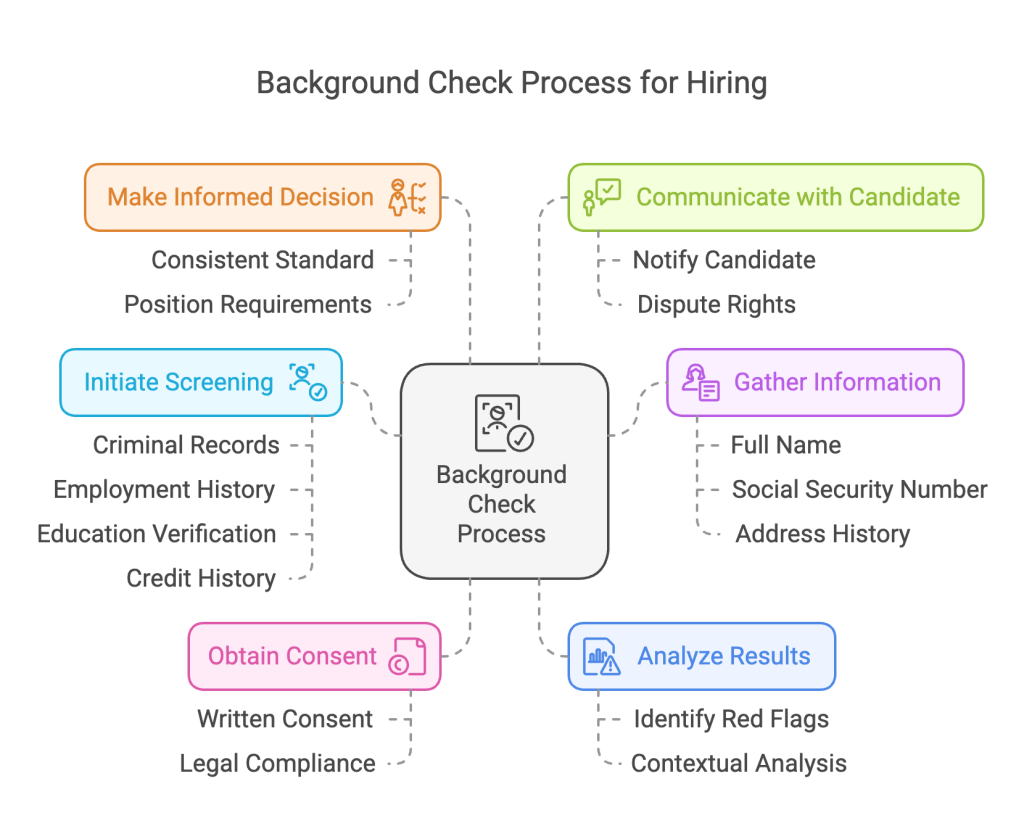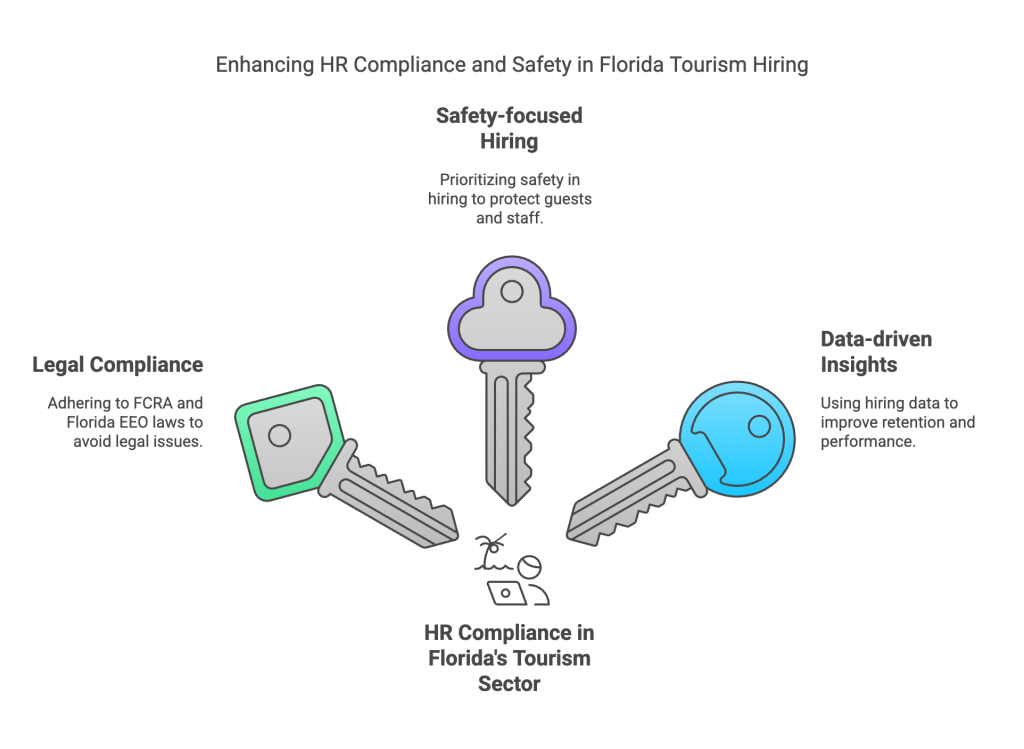Florida, known for its vibrant tourism and hospitality industries, stands as a beacon for millions of visitors yearly. This sector's employment opportunities are vast and diverse, yet they come with unique challenges, especially regarding hiring practices. Conducting effective background checks is crucial to ensuring safety, securing employee integrity, and maintaining industry standards. This guide explores the essentials of running tourism background checks in Florida, offering insights from legal, social, and technological perspectives.
Key Takeaways
- Florida's tourism industry relies heavily on thorough background checks to maintain safety and trust.
- Understanding and following both federal and Florida-specific legal guidelines are crucial for a compliant hiring process.
- Background checks involve steps like obtaining consent and analyzing data carefully to ensure candidates fit job roles.
- Seasonal hiring pressures can be managed by using technology and external partners to conduct efficient background checks.
- Regularly updating your hiring practices based on legal changes and past experiences enhances both compliance and candidate quality.
Introduction
Florida's tourism industry fuels a significant portion of the state's economy. It attracts millions of visitors annually, leading to countless job opportunities across hotels, theme parks, and restaurants.
Background checks play a pivotal role in ensuring visitor safety and providing top-notch service. They help employers confirm the trustworthiness of potential hires, which is essential in a high-stakes environment like tourism.
This guide will cover various aspects of executing background checks efficiently and legally, focusing on the specific needs of Florida's tourism and hospitality sectors. You'll find insights into legal requirements, practical steps, and best practices for navigating the hiring process.
Understanding Background Checks in Florida
A background check is a crucial step in the hiring process, especially in the tourism and hospitality industries. It involves verifying an individual's past, including their employment history, criminal record, and education credentials. For tourism and hospitality jobs in Florida, this step ensures you're hiring someone who can be trusted with your business and guests' safety.
Florida's legal landscape presents unique challenges. The Fair Credit Reporting Act (FCRA) is a federal law regulating how personal information about employees can be obtained and used. In Florida, you must also consider state-specific rules protecting employee privacy. Knowing these regulations will keep you compliant and prevent potential lawsuits.
High turnover rates and the pressures of seasonal hiring further complicate background checks in Florida. During peak tourist seasons, the demand for staff increases rapidly. With this surge, you face the challenge of conducting thorough checks quickly. Rushed hiring processes can lead to overlooking crucial information, raising the risk of hiring unsuitable candidates.
Are you prepared to navigate these complexities? Understanding the legal framework and specific challenges can help you create a robust background check process tailored to Florida's tourism sector.
Legal Considerations for Tourism Background Checks
Background checks in Florida's tourism sector are heavily influenced by the Fair Credit Reporting Act (FCRA). The FCRA governs how background checks should be performed, focusing on accuracy and consumer protection.
For compliance, you must provide clear disclosure and obtain written consent before conducting a background check. Pay attention to recent legal updates. For example, any adverse action based on the check requires notifying the candidate and offering them a chance to dispute the findings.
Workplace privacy laws add another layer. Florida emphasizes employee privacy, dictating that checks must not infringe on personal boundaries more than necessary. This involves knowing what information you're permitted to seek and under what circumstances.
Criminal screenings are particularly crucial in this sector. Tourism jobs require safeguarding the public. However, you face legal hurdles. Florida law limits the scope to relevant convictions. Dismissals or sealed records often can't be considered. To navigate this, tailor your screening criteria to align with the specific role requirements.
How can you ensure your checks are both effective and legal? Regularly reviewing your screening policies with legal counsel is one approach. Staying educated on state-specific laws is another critical step. By doing so, you mitigate risks and ensure your hiring process remains both compliant and robust.
The Process of Conducting Background Checks
Conducting a background check involves a series of steps, each essential to a reliable hiring process. Here's a breakdown:
Steps Involved
- Obtain Consent: Before conducting a background check, you must secure written consent from the candidate. This is not just a courtesyâitâs a legal requirement under the Fair Credit Reporting Act (FCRA).
- Gather Information: Collect necessary information from the candidate. Typically, this includes full name, Social Security number, and address history. You'll use this data to search public records and verify the identity.
- Initiate Screening: This can involve checking criminal records, employment history, education verification, and sometimes credit history, depending on the role. Each check serves a different function in assessing the candidate's suitability for the job.
- Analyze Results: Once the data is gathered, it's time to make sense of it. Look for discrepancies or any red flags that could indicate potential risks. Remember, not all negative marks are deal-breakers; context is key.
- Make an Informed Decision: Use the information to make an informed hiring decision. Weigh the findings against the requirements of the position. It's critical to apply a consistent standard for each candidate to ensure fairness.
- Communicate with the Candidate: If the background check leads to reconsidering the hiring decision, you must notify the candidate. Under the FCRA, they have the right to dispute inaccurate information.

Using Technology Effectively
Technology has streamlined the background check process significantly. AI tools and online databases allow for quicker and more accurate screenings. Automated systems can handle large volumes of applications, making it easier to manage seasonal hiring.
However, technology is only as good as the data it accesses. Ensure that the platforms you use are reputable and compliant with all applicable laws.
Common Pitfalls
Mistakes happen, but some are avoidable with preparation. One frequent error is relying solely on online screenings without verifying the data. Another is skipping the candidate consent step, which can lead to legal repercussions.
Lastly, be wary of biases that may seep into the evaluation of background check results. Always stick to objective criteria when interpreting findings.
Adhering to these practices helps ensure that your background checks are thorough, fair, and effective. Are you confident that your current process measures up?
Industry-Specific Considerations
Floridaâs hospitality sector demands a unique approach to hiring. The importance of stellar customer service makes the screening process crucial. You need to identify candidates who can uphold your business's reputation. High turnover is common, which places pressure on maintaining a ready pool of qualified candidates.
Screening for hotel staff is vital. Each roleâfrom front desk to housekeepingâinvolves guest interaction. A well-conducted background check ensures that staff can be trusted with the personal safety and belongings of guests. Neglecting this step can lead to legal liabilities and harm to your establishment's image. Always collect comprehensive background data to make informed hiring decisions.
Seasonal hiring presents challenges. The influx of tourists during peak seasons calls for a rapid increase in staff. Conducting background checks at scale can seem daunting, but it's necessary. Start early and consider partnering with firms specializing in volume checks. They offer sophisticated tools that sort through high volumes quickly. This efficiency prevents bottlenecks and lets you focus on training and operations.
These industry-specific contexts guide hiring methods. They drive the need for timely and thorough background checks to match the fast-paced demands of Floridaâs tourism and hospitality industries.
Best Practices for HR Compliance
Navigating HR compliance in Florida's tourism sector requires vigilance and accuracy. You need to be aware of both state-specific and federal regulations to stay compliant. Understanding and integrating these into your hiring practices is essential.

HR Compliance in Tourism Florida
Familiarize yourself with the Fair Credit Reporting Act (FCRA) and the Florida-specific Equal Employment Opportunity (EEO) laws. Ensuring all paperwork is correct before conducting background checks can save you headaches. Missteps in compliance can lead to lawsuits or reputational damage.
Consider consent forms. You must obtain a clear, written agreement from candidates before performing a check. This not only fulfills legal obligations but builds trust early in the employer-employee relationship. Always provide candidates with a summary of their rights under the FCRA.
Safety-focused Hiring Florida
In the tourism industry, safety can't be compromised. Incorporating safety-focused questions in interviews can highlight the candidateâs commitment to this important aspect. Prioritize criminal history checks for roles involving high guest interaction or access to sensitive areas.
When evaluating background check reports, consider relevance. A minor infraction from years ago might not outweigh a decade of excellent work history. Use judgment and adjust the decision to the specific risks associated with the job role.
Data-driven Insights
Review data from past hiring processes. Analyze what types of findings led to high employee retention and performance. This can help fine-tune your future background screening criteria.
For instance, a case study on a major Florida resort found that stringent vetting of temporary staff, combined with a structured onboarding program, reduced seasonal staff turnover by 30% in one year. Consider adapting such proven practices to improve your own processes.
HR compliance isnât just about following rules. Itâs about creating a reliable framework for securing the best staff. Are your hiring practices reflecting your company's values and safety standards? Use these insights to ensure compliance and enhance your hiring success.
Addressing Social and Ethical Considerations
Balancing safety and privacy in background checks is one of the most nuanced challenges you will face as an employer. Your objective is to create a safe environment for customers and employees alike while respecting the privacy of potential hires. Privacy concerns arise when checks dig into areas like credit history or personal life details. Consider restricting your checks to information directly relevant to the job. This approach respects candidate privacy and focuses on what matters most for the role.
Diversity and inclusion play a crucial role in your hiring process. Background checks, if not conducted carefully, can unintentionally exclude candidates from diverse backgrounds. Avoid blanket policies that disqualify candidates based on certain criminal records. Instead, evaluate the context and relevance of any findings to the position you're hiring for. This thoughtful consideration ensures your workforce represents a wide variety of perspectives and experiences.
Your social responsibility extends beyond hiring. Imagine the impact on community trust if safety incidents occur due to inadequate checks. Think of background screening as part of your company's social fabric. When you prioritize ethical hiring, you strengthen public confidence and contribute positively to Florida's tourism sector. Remember, thoughtful background checks are not just a regulatory taskâthey're a step towards building a reputable, secure, and inclusive workplace.
Actionable Takeaways
You want your background checks to be thorough yet efficient. Hereâs how:
Key Insights:
Understand the local context. Florida's tourism sector is diverse and fast-paced. Familiarize yourself with specific challenges, such as seasonal spikes in hiring and high turnover rates.
Staying compliant is non-negotiable. The Fair Credit Reporting Act (FCRA) and specific Florida laws lay down what you can and cannot do. Regularly update yourself on these regulations.
Practical Tips:
- Consent and Communication: Always get written consent from candidates before starting a background check. Be transparent about what the check involves.
- Tailor Your Checks: Different roles require different checks. For a customer-facing position, prioritize criminal history and customer service experience. For back-office positions, focus on credit history and past employment.
- Embrace Technology: Use online databases and AI tools to speed up the process. They can reduce human error and cut down screening time.
- Efficient Data Handling: Make sure you have systems to securely store personal data. Proper handling not only keeps you compliant but builds trust with potential employees.
- Review and Refine: After each hiring season, evaluate your process. Identify what worked and what didnât. Refine your strategy continuously.
Future Trends:
Watch for shifts in privacy laws or industry regulationsâthese can change quickly. Stay ahead by following legislative updates.
Emerging tech like AI in background screening is advancing rapidly. Itâs revolutionizing how data is analyzed and interpreted.
Are you prepared for these changes? The landscape will keep evolving, and so should your practices. Stay informed, updated, and ready to adapt.
Conclusion
Background checks are a linchpin in Florida's tourism sector. They underpin safety and trust, crucial for both guests and staff.
Implement processes that align with best practices. Doing so enhances the reputation of your organization and the industry as a whole. A strategic approach ensures that you hire the right people while keeping aligned with regulations and innovations.
Stay informed about legal updates and technological advancements. Adaptability and continuous learning are essential in an ever-evolving field. Your vigilance will help maintain the integrity and safety of one of Florida's most vital industries.
Additional Resources
- Explore the GCheck Blog for in-depth articles on background checks, regulatory updates, and practical hiring strategies tailored for the tourism sector.
- Visit the Professional Background Screening Association for insights into industry standards, compliance guidelines, and research reports that can help refine your background check processes.
These resources offer valuable information and tools to ensure your background check practices are thorough, current, and compliant with both Florida and national standards.
Frequently Asked Questions (FAQs)
What background checks are required for hotel staff in Florida?
- Employers commonly check criminal records to ensure a safe environment for guests.
- Hotels may also verify previous employment and references.
- Some positions may require driving record checks if driving is part of the job.
How can tourism employers in Florida comply with FCRA laws?
- Provide a clear and conspicuous disclosure to the applicant in writing.
- Obtain the applicantâs consent before conducting a background check.
- If adverse action is taken based on the report, provide the applicant a copy and a summary of rights under the FCRA.
Are background checks mandatory for seasonal hospitality workers in Florida?
- While not legally mandated, many employers perform background checks to maintain safety.
- It's at the employer's discretion but is highly recommended.
What information is most commonly verified for Florida tourism jobs?
- Employment history and references.
- Criminal background and sex offender registry.
- Education verification for certain positions.
How can hospitality employers balance speed and accuracy in background checks?
- Use reputable background check services known for quick turnaround times.
- Streamline internal processes to reduce delays.
- Set clear timelines and update applicants throughout the process.
What safety protocols rely on background checks in Floridaâs tourism industry?
- Ensuring employees do not have violent criminal histories for guest safety.
- Protecting company assets by verifying employee trustworthiness.
- Compliance with regulations for jobs requiring interaction with vulnerable populations.
What should employers do if an applicant disputes a background check result?
- Investigate the dispute promptly and thoroughly.
- Communicate with the applicant and the background check provider.
- Provide the applicant with a chance to explain or correct any discrepancies.
How often should background checks be updated for current employees?
- Generally done at the time of promotion or transfer to a new position.
- Periodic checks may be wise for roles that involve high security or handling financial transactions.
What are the potential legal risks of not conducting background checks?
- Increased liability in cases of employee misconduct.
- Potential damage to brand reputation and guest trust.
- Risk of non-compliance with industry regulations.
How should employers handle sensitive information found during background checks?
- Keep information confidential and share only with those who need to know.
- Store records securely, both digitally and physically.
- Dispose of records properly when they are no longer needed.
Definitions
- Background Check - A background check is a process employers use to verify a candidate's history, including their criminal record, employment history, education credentials, and sometimes credit information. It helps to ensure that potential hires are trustworthy and suitable for the role, especially in sensitive industries like tourism. This step is essential for maintaining workplace safety and regulatory compliance.
- Fair Credit Reporting Act (FCRA) - The Fair Credit Reporting Act (FCRA) is a federal law that regulates how employers use consumer information during the hiring process. It mandates clear disclosures, written consent from candidates, and the right to dispute findings. This ensures that hiring decisions based on background checks are fair and transparent, safeguarding both employers and applicants.
- Consent - Consent refers to the requirement for employers to obtain clear, written permission from a candidate before conducting a background check. This practice ensures transparency and complies with legal standards, such as the FCRA. Providing consent demonstrates mutual respect and trust between the employer and prospective employee.
- Turnover Rate - Turnover rate indicates the frequency at which employees leave and are replaced within an organization. High turnover is a common challenge in Floridaâs tourism industry, particularly during seasonal hiring periods. Managing turnover effectively requires efficient hiring processes and strategies to retain a qualified workforce.
- Employee Privacy - Employee privacy encompasses the legal and ethical obligation to handle personal information obtained during background checks responsibly. Employers must avoid seeking irrelevant data and ensure that the information gathered is directly related to the job. This balance promotes trust while staying within legal boundaries.

GCheck Editorial Team
Meet the GCheck Editorial Team, your trusted source for insightful and up-to-date information in the world of employment background checks. Committed to delivering the latest trends, best practices, and industry insights, our team is dedicated to keeping you informed.
With a passion for ensuring accuracy, compliance, and efficiency in background screening, we are your go-to experts in the field. Stay tuned for our comprehensive articles, guides, and analysis, designed to empower businesses and individuals with the knowledge they need to make informed decisions.
At GCheck, we're here to guide you through the complexities of background checks, every step of the way.





